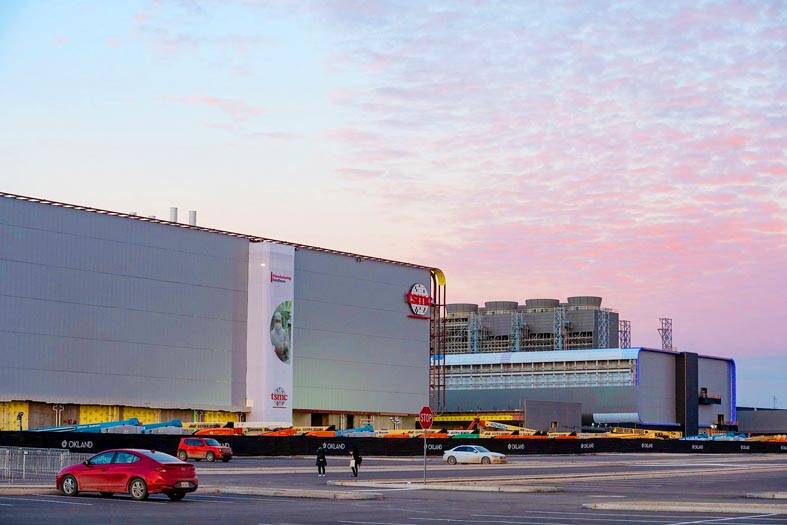Taiwan Semiconductor Manufacturing Co (TSMC, 台積電), the world’s largest contract chipmaker, has promised that Americans would be prioritized in its hiring process for jobs to build the company’s cutting-edge wafer fabs in Arizona.
In a statement released on Tuesday, TSMC said the company has no intention of replacing US workers with foreigners, and would continue to hire locally for the construction of the wafer fabs and equipment installation.
The company is investing US$40 billion to build two mega wafer fabs in Phoenix to cater to the demand of its US customers.

Photo: Caitlin O’Hara, Bloomberg
The statement comes after a major construction worker union fired back at TSMC’s “offensive” claims of a lack of skilled workers for the construction of its facility in Phoenix during an investors’ conference in Taipei on July 20.
TSMC chairman Mark Liu (劉德音) said at the meeting that the start of mass production in one fab — which is to use advanced 4-nanometer process technology — would be delayed from late next year to 2025, because the facility was facing “some challenges.”
Liu attributed the delay to a lack of workers with the required expertise for equipment installation in the Arizona fab.
Another fab under construction in Arizona, which is to deploy 3-nanometer process technology, is scheduled to begin mass production in 2026. Liu did not mention any change to the timeframe of that fab.
In an article published in the Phoenix Business Journal on Wednesday last week, Aaron Butler, head of the Arizona Building and Construction Trades Council, said that TSMC should not blame US workers for the construction delays.
“Blaming American workers for problems with this project is as offensive to American workers as it is inaccurate,” Butler said. “This leaves just one alternative conclusion: that TSMC is blaming its construction delays on American workers and using that as an excuse to bring in foreign workers who they can pay less.”
Butler said workers in Arizona have been building fabs and installing production equipment for 40 years while working for Intel Corp, adding that the state boasts a highly skilled workforce well prepared for this type of work.
Butler added that the unions have fulfilled all the working hours required by TSMC, in response to claims that there was a shortage of skilled US workers.
However, in its statement, TSMC did say that because the company requires specific skills for the construction of the Arizona fab and equipment installation, it would need to send a limited number of workers to the US state on a temporary basis.
TSMC said the number of workers traveling to Arizona had not been finalized and that their presence would not affect the 12,000 workers currently working on-site and its general US-based hiring process.
The chipmaker said the presence of skilled workers for a short amount of time would facilitate the training of their counterparts in Arizona, and that this arrangement would allow the company to accelerate its push for investments in the state, which would in turn lead to significant economic benefits through the creation of thousands of high-paying jobs, and the innovation drive in Arizona and across the nation.

The US dollar was trading at NT$29.7 at 10am today on the Taipei Foreign Exchange, as the New Taiwan dollar gained NT$1.364 from the previous close last week. The NT dollar continued to rise today, after surging 3.07 percent on Friday. After opening at NT$30.91, the NT dollar gained more than NT$1 in just 15 minutes, briefly passing the NT$30 mark. Before the US Department of the Treasury's semi-annual currency report came out, expectations that the NT dollar would keep rising were already building. The NT dollar on Friday closed at NT$31.064, up by NT$0.953 — a 3.07 percent single-day gain. Today,

‘SHORT TERM’: The local currency would likely remain strong in the near term, driven by anticipated US trade pressure, capital inflows and expectations of a US Fed rate cut The US dollar is expected to fall below NT$30 in the near term, as traders anticipate increased pressure from Washington for Taiwan to allow the New Taiwan dollar to appreciate, Cathay United Bank (國泰世華銀行) chief economist Lin Chi-chao (林啟超) said. Following a sharp drop in the greenback against the NT dollar on Friday, Lin told the Central News Agency that the local currency is likely to remain strong in the short term, driven in part by market psychology surrounding anticipated US policy pressure. On Friday, the US dollar fell NT$0.953, or 3.07 percent, closing at NT$31.064 — its lowest level since Jan.

The New Taiwan dollar and Taiwanese stocks surged on signs that trade tensions between the world’s top two economies might start easing and as US tech earnings boosted the outlook of the nation’s semiconductor exports. The NT dollar strengthened as much as 3.8 percent versus the US dollar to 30.815, the biggest intraday gain since January 2011, closing at NT$31.064. The benchmark TAIEX jumped 2.73 percent to outperform the region’s equity gauges. Outlook for global trade improved after China said it is assessing possible trade talks with the US, providing a boost for the nation’s currency and shares. As the NT dollar

The Financial Supervisory Commission (FSC) yesterday met with some of the nation’s largest insurance companies as a skyrocketing New Taiwan dollar piles pressure on their hundreds of billions of dollars in US bond investments. The commission has asked some life insurance firms, among the biggest Asian holders of US debt, to discuss how the rapidly strengthening NT dollar has impacted their operations, people familiar with the matter said. The meeting took place as the NT dollar jumped as much as 5 percent yesterday, its biggest intraday gain in more than three decades. The local currency surged as exporters rushed to